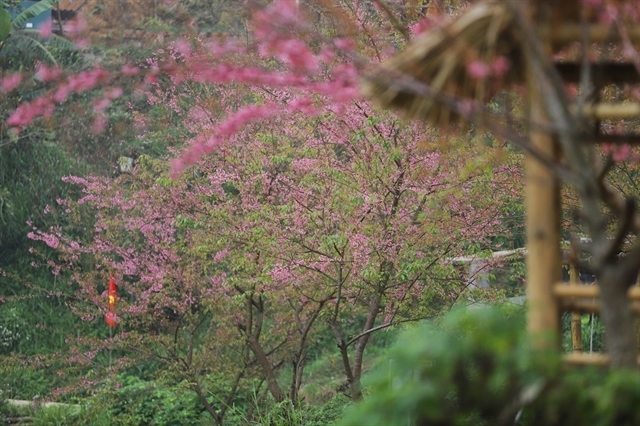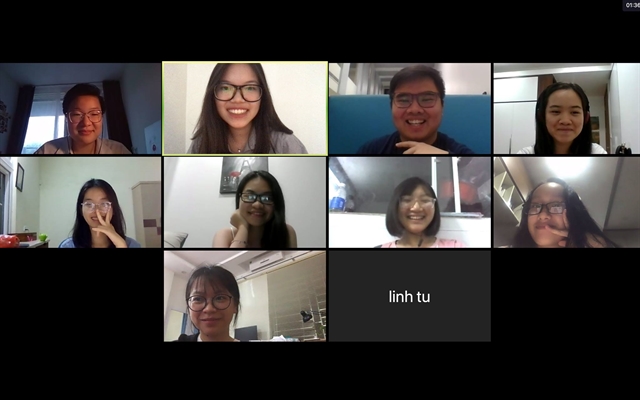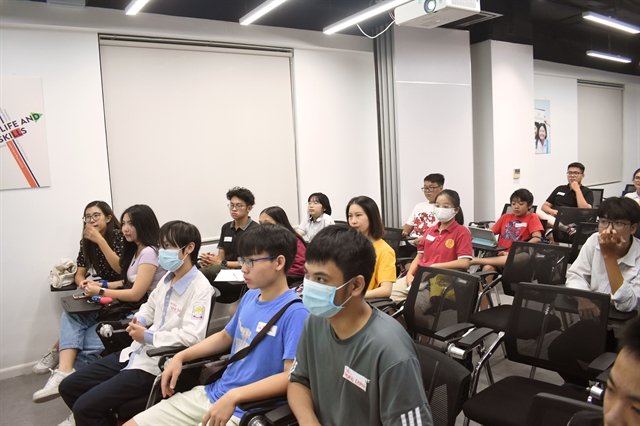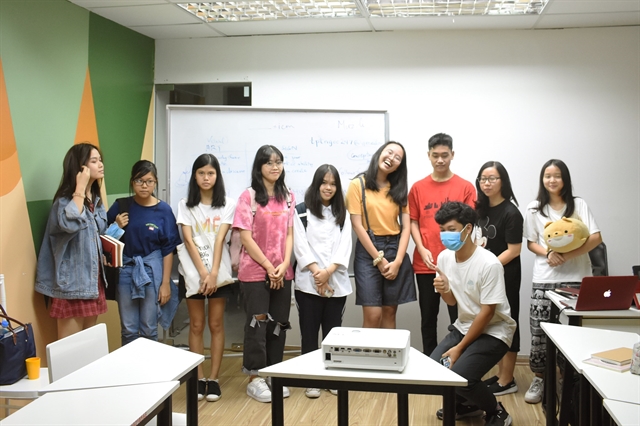 Features
Features

Nguyễn Quang Tùng and Lưu Phương Thảo are two young aspiring educators hoping to change conventional learning and teaching. Currently back in Vietnam, they created MỞ - Mơ và Hỏi (Open – dream and ask) project that helps Vietnamese students find their passion in learning and shift from “have to learn” to “get to learn” mindset.
By Hoàng Vân Anh
Nguyễn Quang Tùng and Lưu Phương Thảo are two young and aspiring educators hoping to change conventional learning and teaching.
Both are back in Việt Nam at the moment, because of the COVID-19 pandemic. From talking to university students who have returned home from overseas studies, it became quite clear to them that there are myriad subjects not yet available in the country’s K-12 education sector.
At the age of 21, they then jumped at the opportunity to create the Mở-Mơ và Hỏi (Open-Dream-Ask) project, which allows students to select subjects such as International Relations, Film Studies, Public Speaking, Design Thinking and Creative Writing.

|
| ISSUES OF THE DAY: Teacher Jason Trịnh and his students discuss the US presidential election during a trial class. Photo courtesy of Mở |
Like a lot of kids, there was a time when Tùng didn’t possess the appropriate communication skills.
“I would leave the subject box empty on emails, or give my files random names,” he said when remembering the things he once simply didn’t know.
He’s now noticed that the current generation of young Vietnamese who reach out to him are also short on communication skills.
“I reply, but suggest how to reach out in a more respectful tone, and then ask them to contact me again,” he explained.
Moreover, Tùng was inspired by a teacher of the art of public speaking and then found the power of good communicators. He decided to take on the role of mentor to help other kids.
His blog, Akwaaba, Tùng, is where he shares his stories, experiences, and viewpoints. Once, when a blog follower reached out and said she had never experienced anything remotely similar, Tùng raised funds and went around the country talking about the benefits of risk-taking and networking techniques, including to the follower’s hometown.
She couldn’t believe that this was his response. “I never thought I’d get to meet you guys,” she said, “because you are high achievers and unapproachable role models.”
A mission then began to take shape: giving people hope, teaching them to have the courage to reach out and share their own authenticity. He’s now hoping to pique the curiosity potential learners of all stripes possess.
Thảo, meanwhile, who will soon graduate in Peace Studies, has experience as a teaching assistant at the university, where she gained insights into issues encountered in the educational institution system, such as a lack of communication between office staff, teachers and students. Experience taught her more about the importance of listening and of peaceful communication.
She was also inspired by her International Relations teacher, who, she said, “is not only capable of making big political issues memorable by linking them to relatable daily personal problems, but can also make an impact and change a community through education.”
Thảo later recognised her own potential and wanted to create a community where she could empower students.
Tùng got the idea for Mở (Open) after seeing how his cousin constantly complained about school but very much enjoyed learning how to play the organ. He speculated that “we are born as inquisitive learners, but become distracted by and carried away with social standards like grades, achievements and awards, and competition. We learn in classrooms and join competitions, but we don’t understand the purpose of what we do, so no longer enjoy studying.”
The project was created with the hope of helping Vietnamese students find their passion in learning and shift from a mindset of “have to learn” to “want to learn”.
Open’s mission is simple: allow students to be curious and explore different subjects that spark their interest. Its classes are inspired by the liberal arts education model, incorporating critical thinking, learning through participating and doing, and applying knowledge locally and globally.

|
| EYES FRONT: Students paying careful attention in one of the classes. Photo courtesy of Mở |
At one public speaking class, during introductions, Tùng pointed out that we typically use a formula to present boring facts about ourselves, like age or the name of our school, and rarely make a strong impression. He then asked each student to associate their personality to an object and, by the end, students had managed to remember each other as interesting individuals.

|
| HAPPY FACES: Everyone seems satisfied as the class comes to an end. Photo courtesy of Mở |
While the project has a promising goal, along the way they have encountered countless challenges. Besides the project’s basic operations, they also had to create a business strategy suitable for an education service provider. It’s been very much like a start-up, “running things with extreme uncertainty”, Tùng said.
With an open mind, a spirit of “you won’t know until you try”, and Tùng’s belief that failures teach new lessons, the two are quite pleased with what they have achieved in the last few months.
Open’s International Relations class held trial classes on Zoom that focused on the upcoming US presidential election, and it was so popular there were no spots left after just two days of registrations.
Educationalist and author Nguyễn Thị Thu who also founded Tsubaki kindergarten highly recommended that students join Open.
“Open’s classes are truly worth attending, because they allow you to access resourceful tutors as well as make new friends with the same positive mindset,” she said. “The offline classes allow for much stronger links to be built, and the positive energy from people supporting each other can’t be found elsewhere.”
Trần Thị Nguyệt from the Bank for Investment and Development of Việt Nam (BIDV), meanwhile, is busy attending the Design Thinking class with a few high school students.
Shared beliefs may bind Tùng and Thảo together, but their visions differ. While Tùng simply hopes the project will run smoothly in the year to come, Thảo is keen to create a space where anyone is allowed to learn anything, just for fun and with no pressure. From the small city of Bắc Ninh, just north of Hà Nội, she hopes to reach out to a larger audience and enable kids in the countryside to have equal opportunity to learn new things. From her experience at summer camps, she also hopes to build a community through such mediums.
Tùng hopes that his kids’ generation are able to receive a quality education at home that is comparable to experiences abroad.
Both he and Thảo hope to work for Fulbright Vietnam, as its non-profit objectives align with their goals of providing a fun education. VNS




